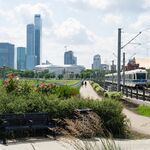From the research I've been doing, the level of development and control regarding this park is very much up in the air. Rogue National Park, the first such urban national park, was created through the Rogue National Park Act. It was tailor-made to suit the region. I imagine something similar would take place with these proposed ones.
I don't think it's simple enough to assume that touch the water, bike trails, and other things would have to be scrapped. This will involve a complex series of negotiations among the feds, all municipalities along the river between Devon and Fort Sask, Indigenous groups, other interest groups, and the residents themselves. And there's no gaurantee about which land will be acquired to begin with. We can look to Rogue to get an idea of the similarities and differences between national and urban national parks, but we shouldn't assume that it'll be a copy and paste solution. I think that this does have the potential to constructively build off the work that Edmonton has started, and take it to the next level.
Sure, it could just as easily move us backwards. But given that it gives us the potential of unlocking tens or hundreds of millions of dollars of federal funding for the regional river valley, the feds would organize and fund numerous events and initiatives for residents and tourists visiting the park, not to mention branding, trail networks connecting municipalities along the river, etc., this has great potential to help us do more to make our river valley accessible than we could ever do by ourselves. This is more than just one part of Edmonton (yes, I'm very pro-touch the water). This is 70+ km of river valley that can be made more accessibe to people from the region as well as from abroad.




